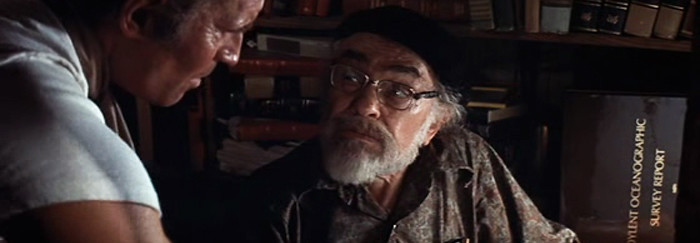This post is the fourth of seven posts about the future. Caveat lector.

In Jorge Luis Borges’ short story Tlön, Uqbar, Orbis Tertius a mysterious encyclopaedia entry leads to the discovery of a new world, a world whose precepts eventually achieve dominance on Earth. The ideas of Tlön manifest themselves in the physical world, until the old world has passed away.
In Tlön, Berkeleian idealism reaches its apogee. Berkeley believed that it was impossible to separate existence and perception: only that which could be directly perceived “existed”, and the rest of the material world was sustained by an omnipresent loving God. In Tlön, God is surplus to requirements. The Tlönian view recognizes perceptions as primary and denies the existence of any underlying reality. Things must be seen to survive: “Occasionally a few birds, a horse perhaps, have saved the ruins of an amphitheater.”
This is the worldview of the Pirahã, as described by Daniel Everett in his book Don’t Sleep There are Snakes:
When I first started working with the Pirahã, I realized that I needed more linguistics if I was going to understand their language. When I began to tell them the stories from the Bible, they didn’t have much of an impact. I wondered, was I telling the story incorrectly? Finally one Pirahã asked me one day, well, what color is Jesus? How tall is he? When did he tell you these things? And I said, well, you know, I’ve never seen him, I don’t know what color he was, I don’t know how tall he was. Well, if you have never seen him, why are you telling us this?
This is the immediacy of experience principle. If you didn’t see it, it didn’t happen.
This is what is becoming in the world: the acceptance, only, of lived experience. I did not hear it if it did not scrobble, I did not see it if it’s not on Flickr, I did not say it if it is unpublished. Without Foursquare, I am not even there.
Because of the network, our lived experience now encompasses everything: hence Network Realism. The All-Seeing Eye. The shared electronic consciousness, endlessly proliferating.
We’re repeatedly told that computers’ memories are better than ours, that Facebook photos will ruin our future careers, that our youthful indiscretions will last for a thousand years in the mind of the network. And so we give up our memories to the machines, endlessly feeding them with our thoughts and our experiences, hoping, desperately, to preserve them. Attempting to defy death.
Instagram is all about death. The 70s filters our parents used, artifacts of cameras we’ve never held. Nostalgia is the negation of death, it proves we are still living even without an identifiable future. Instagram is a machine for producing instant nostalgia, a ward against death.
There’s been a recent rush of deliberate delayed-nostalgia services: Photojojo’s Time Capsule, Twitshift, 4squareand7yearsago. They are good, but they are strangely insecure. Tell me I have lived. Remind me. I cannot remember.
We are told that digital (over)sharing on social networks and the like is a natural human impulse, that we’re merely augmenting extant human needs, the need to communicate, to form social groups. But what if sharing is actually a mourning for what we have lost? Or, that which our lives are now too full to contain.
The world overflows with experience and information. We cannot remember or contain it all. And so we attempt to spread it, jettisoning it back into the world in order to preserve it.
The process of evolution and civilisation is a process of outsourcing, of labour, of capital, of our own neurophysiological processes. We are all electrical systems: the National Grid is an outsourcing of the nervous system. All infrastructures are prosthetics, outsourcing our physical properties.
The internet is the outsourcing of our mental faculties, but books, written and recorded music, literature and song have been technologies for remotely storing mental faculties—culture—in physical media and in delay loops, for quite some time.
I asked “Why is outsourcing our memory different to outsourcing our food or electricity supplies?”
And Will replied “Maybe we’ll look back on the era of “subsistence memory” with the same horror as we regard subsistence farming.”
Sharing is a form of memory. Memory is an active process, it must be constantly enacted and consumed. Soylent Green is our own memories.
This is, of course, not just about network technologies; the network merely promulgates and synthesises ideas faster than ever before. In Plato’s Phaedrus, Socrates repeats the speech of an Egyptian King named Thamus to Theuth, the god who has just invented writing:
“This invention, O king,” said Theuth, “will make the Egyptians wiser and will improve their memories; for it is an elixir of memory and wisdom that I have discovered.”
But Thamus replied, “Most ingenious Theuth, one man has the ability to beget arts, but the ability to judge of their usefulness or harmfulness to their users belongs to another; and now you, who are the father of letters, have been led by your affection to ascribe to them a power the opposite of that which they really possess. For this invention will produce forgetfulness in the minds of those who learn to use it, because they will not practice their memory. Their trust in writing, produced by external characters which are no part of themselves, will discourage the use of their own memory within them. You have invented an elixir not of memory, but of reminding; and you offer your pupils the appearance of wisdom, not true wisdom, for they will read many things without instruction and will therefore seem to know many things, when they are for the most part ignorant and hard to get along with, since they are not wise, but only appear wise.”
Comments are closed. Feel free to email if you have something to say, or leave a trackback from your own site.